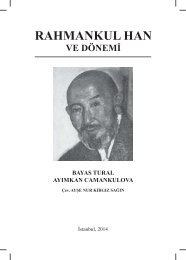THE SOVIET HISTORIOGRAPHY AND THE QUESTION OF KAZAKHSTAN’S HISTORY
SOVYET-TARIH-YAZICILIGI-ENG
SOVYET-TARIH-YAZICILIGI-ENG
You also want an ePaper? Increase the reach of your titles
YUMPU automatically turns print PDFs into web optimized ePapers that Google loves.
110<br />
<strong>THE</strong> <strong>SOVIET</strong> <strong>HISTORIOGRAPHY</strong> <strong>AND</strong><br />
Russian Empire in Soviet historiography. M. N. Pokrovskiy evaluated<br />
the policy of Russia in Central Asia as occupation and said “Turkestan<br />
is the official colony of Russia” 169 . Among the young historians<br />
who supported this idea of Pokrovskiy, there was A. M. Pankratova 170<br />
who was to be the master of E. Bekmakhanov. These historians were<br />
evaluating the inclusion of other communities into Russian Empire<br />
as the colonization policy of Czarist Russia and were using the “absolute<br />
evil” 171 concept for this policy. They saw economic factors,<br />
in other words, commercial capital, new markets, and raw material<br />
sources as the important pushing factors for the inclusion process<br />
of communities into Russia. But after the death of M. N. Pokrovskiy,<br />
these views of him were criticized and changed with Stalin’s concept<br />
of “minimum evil” in 1937. From this point, even if Soviet historians<br />
confessed that Czarist Russia colonized Central Asia and other regions,<br />
they tried to put forward the progressive ways of this, and tried<br />
to prove that they were included into Russia from their own desire.<br />
A. M. Pankratova, who had great role in the preparations of the monograph<br />
of the comprehensive work “Kazakh Soviet Union History,”<br />
as the editor in chief, never gave up her principles. She wrote “We<br />
can never legitimize the colonization policy of Czarist Russia.” 172 A.<br />
M. Pankratova was among the scholars who were sent to Kazakhstan<br />
during the Second World War. A. M. Pankratova had great influence<br />
on E. Bekmakhanov’s understanding of the circumstances of the historical<br />
period he was researching and also keeping his critical attitude<br />
in spite of the negative dimensions of the period. During the Second<br />
World War Soviet, historians had to propagandize for the ideology of<br />
Pokrovskiy School were labeled as “the home for agents, terrorists and evils who masked<br />
themselves properly”. But after the death of Stalin he was cleaned in 1960p. Mentor of E.<br />
Bekmakhanov, A. M. Pankratova was among the scholars who adopted his opinions.<br />
169 Pokrovski. M.N., Diplomatiya i Voyny Tsarskoy Rossii v XIX.Veke, Moscow,1923, p. 8<br />
170 Anna Mihaylovna Pankratova is one of the Soviet Period historians who had great contributions<br />
to Kazakhstan history and also E. Bekmakhanov’s mentor as in his own words,<br />
“Second mother”. During Second World War she was among the scholars who were evacuated<br />
from Moscow to Kazakhstan. During the years she lived in here she played an important<br />
role in the preparation and publication of “Kazakh USSR History”. When E. Bekmakhanov<br />
was criticized because of his studies, she was among a couple of people who supported his<br />
acquittal when he was penalized.<br />
171 Until 1936 Shamil, Kenesary and others were labeled as leaders who fought for freedom<br />
against “public jail”. Bolshevists were castigating all the practices of Czarist Russia. As one<br />
of the scholars who were known with the perspective criticizing colonizing policy of Czarist<br />
Russia, M. N. Pokrovskiy defined this with “absolute evil”. But in 1937 Stalin described this<br />
opinion as anti-Russian and changed with “minimum evil”.<br />
172 Archive RAN, f.1577, opis 2. d.71.



